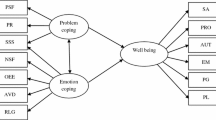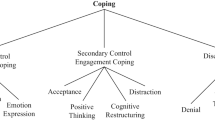Abstract
Consistent with an emphasis on positive psychology, and on ability rather than deficit, this study of adolescents in 4 communities sought to examine how young people cope with their concerns. Samples of Australian, Colombian, German, and Palestinian students completed the general form of the Adolescent Coping Scale, an 80-item instrument used to measure coping. A comparison of young people's usage of 3 coping styles and 18 coping strategies within these communities indicated that Palestinian youth report greater usage of all but three strategies (namely, physical recreation, relaxation, and tension reduction), and German youth report the least usage of 2/3 of the strategies assessed. Both Palestinian and Colombian youth were noted to utilize more seek to belong, focus on the positive, social action, solving the problem, seeking spiritual support, and worry than were German or Australian adolescents. When the relative usage of coping strategies within national settings was considered, some noticeable differences were apparent. For example it was found that regardless of the national setting young people reported most frequent use of working hard and use of problem solving strategies. When it comes to more culturally determined activities such as physical recreation, the Australian and German students ranked this strategy more highly in their coping repertoires than do the Colombians, and more noticeably, the Palestinian students. For example, although physical recreation is ranked as the second most commonly used strategy for the German sample, it is ranked 16th by the Palestinians. The study demonstrates the importance of identifying coping strategies that are reflective of each community under investigation. Similarity in coping cannot be assumed across different student populations. Consequently caution needs to be exercised when importing coping programs from one community to another.
Similar content being viewed by others
REFERENCES
Alsaker, F. D., and Flammer, A. (1999). The Adolescent Experience: European and American Adolescents in the 1990's (Euronet). Erlbaum, New Jersey.
Ardila, R. (1996a). Ethnopsychology and social values in Colombia. Inter Am. J. Psychol. 30: 127–139.
Ardila, R. (1996b). Political Psychology: The Latin American perspective. Pol. Psychol. 17(2): 339–351.
Bailey, F. J., and Dua, J. (1999) Individualism-collectivism, coping styles, and stress in International and Anglo-Australian students: A comparative study. Aust. Psychol. 34(3): 177–182.
Brandon, C. M., Cunningham, E. G., and Frydenberg, E. (1999). Bright ideas: A school based program teaching optimistic thinking skills to pre-adolescents. Aust. J. Guidance Counsell. 9(1): 147–157.
Brotman-Band, E., and Weisz, J. R. (1988) How to feel better when it feels bad: Children's perspectives on coping with everyday stress. Dev. Psychol. 24: 247–253.
Bugalski, K., and Frydenberg, E. (2000). Promoting effective coping in adolescents 'at risk' of depression. Aust. J. Guidance Counsell. 10(1): 112–132.
Cotta, A., Frydenberg, E., and Poole, C. (2001). Coping skills training for adolescents at school. Aust. Educ. Dev. Psychol. 17(2): 103–116.
Ebata, A. T., and Moos, R. H. (1991): 33–54.
Folkman, S. (1982). An approach to the measurement of coping. J. Occup. Behav. 3: 95–107.
Fredrickson, B. L. (2001). The role of positive emotions in positive psychology. Am. Psychol. 3: 218–226.
Frindte, W., and Carmil, D. (1996b). The foreigner is the void-an investigation of German and Israeli youths' attitudes toward foreigners. Int. J. Psychol. 31(3/4): 474–475.
Frindte, W., Funke, F., and Waldzus, S. (1996a). Xenophobia and Right-Wing Extremism in German youth groups-some evidence against unidimensional misinterpretations. Int. J. Intercult. Relat. 20(3/4): pp. 463–478.
Frindte, W., Neumann, J., Hieber, K., Knote, A., and Müller, Chr. (2001). Rechtsextremismus-"Ideologie plus Gewalt"-Wie ideologisiert sind rechtsextreme Gewalttäter? Zeitschrift für Politische Psychologie 9(2/3): 81–98.
Frydenberg, E., and Brandon, C. M. (2002). The Best of Coping. Melbourne: Oz Child.
Frydenberg, E., and Lewis, R. (1993a). Manual: The Adolescent Coping Scale. Australian Council for Adult Educational Research, Melbourne.
Frydenberg, E., and Lewis, R. (1993b) Boys play sport and girls turn to others: Age, gender and ethnicity as determinants of coping. J. Adolesc. 16: 253–266.
Frydenberg, E., and Lewis, R. (1996). A replication study of the structure of the Adolescent Coping Scale: Multiple forms and applications of a self-report inventory in a counselling and research context. Eur. J. Psychol. Assess. 12(3): 224–235
Frydenberg, E., Lewis, R., Ardila, R., Cairns.E., and Kennedy, G. (2001). Adolescent concern with social issues: An exploratory comparison between Australian, Colombian and Northern Irish students. Peace Conflict: J. Peace Psychol. 7(1): 59–76.
Gibson-Kline, J. (1996). Adolescence: From Crisis to Coping. A Thirteen Nation Study. Butterworth-Heinemann, Oxford.
Jerusalem, M., and Schwarzer, R. (1988). Anxiety and self-concept as antecedents of stress and coping: A longitudinal study with German and Turkish adolescents. Person. Indiv. Diff. 10(7): 785–792.
Jose, P. E., D'Anna, C. A., Cafasso, L. L., Bryant, F. B., Chiker, V., Gein, N., and Zhezmer, N. (1998). Stress and coping among Russian and American early adolescents. Dev. Psychol. 34(4): 757–769.
Lazarus, R. S., and Folkman, R. S. (1984). Stress, Appraisal, and Coping. Springer, New York.
Palestinian Central Bureau of Statistics (2000). http://www.pcbs.org
Petersen, A. C. (1993). Presidential address: Creating adolescents: The role of context and process in developmental trajectories. J. Res. Adolesc. 3(1): 1–18.
Qouta, S., and El-Sarraj, E. (1994). Palestinian children under curfew. Derasat-Nafseya 4(1): 1–12.
Rice, K. G., Herman, M. A., and Petersen, A. C. (1993). Coping with challenge in adolescence: A conceptual model and psycho-educational intervention. J. Adolesc. 16: 235–251.
Roberts, C. M. (1999). The prevention of depression in children and adolescents. Aust. Psychol. 34(1): 49–57.
Schönpflug, U., and Jansen, X. (1995). Self concept and coping with developmental demands in German and Polish adolescents. Int. J. Behav. Dev. 8: 385–404.
Seiffge-Krenke, I. (1992). Coping behaviour of Finnish adolescents: Remarks on a cross-cultural comparison. Scand. J. Psychol. 33: 301–314.
Seligman, M. E. P., and Csikszentmihalyi, M. (2000). Positive psychology. Am. Psychol. 55: 5–14.
Sheldon, K. M., and King, L. (2001). Why positive psychology is necessary. Am. Psychol. 56(3): 216–217.
Shochet, I., and Osgarby, S. (1999). The resourceful adolescent project: Building psychological resilience in adolescent and their parents. Aust. Educ. Dev. Psychol. 16(1): 46–65.
Author information
Authors and Affiliations
Rights and permissions
About this article
Cite this article
Frydenberg, E., Lewis, R., Kennedy, G. et al. Coping with Concerns: An Exploratory Comparison of Australian, Colombian, German, and Palestinian Adolescents. Journal of Youth and Adolescence 32, 59–66 (2003). https://doi.org/10.1023/A:1021084524139
Issue Date:
DOI: https://doi.org/10.1023/A:1021084524139




